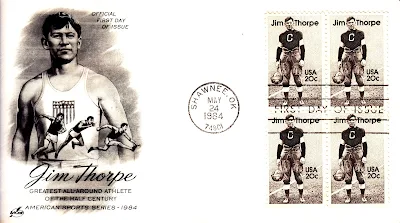USPS in 1984 issued a first day cover stamp to mark the 100th birth anniversary of Jim Thorpe. The 20 cent FDC stamp was released with a postmark from Shawnee, Oklahoma. He was again honoured in a 32 cent stamp in 1998. Shown here is the 1984 issue in a block set.
James Francis Thorpe (Wa-Tho-Huk) was declared by the Associated Press in 1950, “the greatest athlete of the first half of the (20th) century.” Thorpe who was born in 1888 (possibly 1887), grew up in Oklahoma. Born to an Irish father and Sac and Fox Indian mother, Thorpe was raised as a Native American. His name was Wa-Tho-Huk, which means “path lit by great flash of lightning” or “Bright Path.” He was named for light that brightened the path to the cabin where he was born.
James Francis Thorpe (Wa-Tho-Huk) was declared by the Associated Press in 1950, “the greatest athlete of the first half of the (20th) century.” Thorpe who was born in 1888 (possibly 1887), grew up in Oklahoma. Born to an Irish father and Sac and Fox Indian mother, Thorpe was raised as a Native American. His name was Wa-Tho-Huk, which means “path lit by great flash of lightning” or “Bright Path.” He was named for light that brightened the path to the cabin where he was born.
Later, at the Haskell Institute and Carlisle Indian School, he excelled in football and track, becoming a football superstar, professional baseball player, and one of the greatest track and field stars of all time. At the 1912 Summer Olympics in Stockholm, Sweden, Thorpe became the first athlete to win both the pentathlon and the decathlon. Today, in the wake of his leadership, the North American Indigenous Games (“the Indian Olympics”) bi-annually convenes outstanding Native athletes from states and provinces of the U.S. and Canada.
Thorpe’s fame helped to establish football as a popular sport. In 1920 he became the National Football League’s first commissioner. When his athletic career came to an end, Thorpe struggled to support his family. He held a variety of jobs in his later years, including movie extra, construction worker, bouncer, security guard, ditch digger, and merchant marine.
Thorpe’s fame helped to establish football as a popular sport. In 1920 he became the National Football League’s first commissioner. When his athletic career came to an end, Thorpe struggled to support his family. He held a variety of jobs in his later years, including movie extra, construction worker, bouncer, security guard, ditch digger, and merchant marine.
In 1950 he was admitted to hospital for lip cancer. He passed away three years later on 28 March 1953.

No comments:
Post a Comment